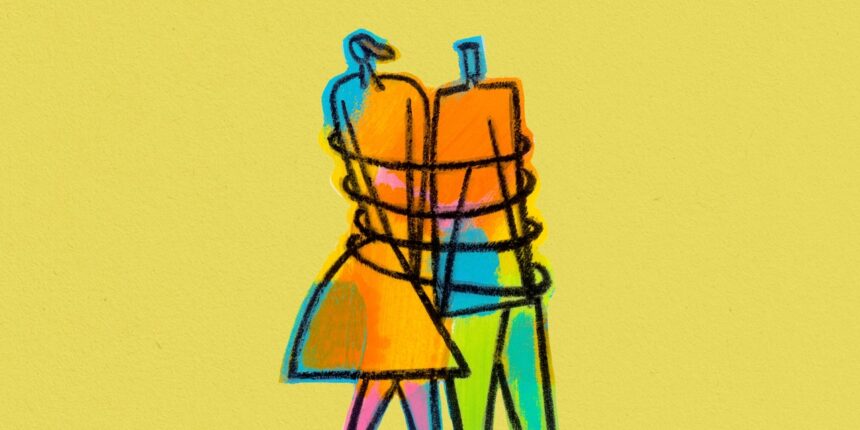If you’ve heard the term codependency tossed around alongside other “toxic” relationship buzzwords, you might picture obvious scenarios where there’s a giver and a taker: A possessive, selfish jerk who takes advantage of their people-pleasing spouse, say, or a well-meaning but overwhelmed partner enabling a loved one with an addiction. However, codependency can show up in everyday, seemingly “healthy” relationships, too—it’s just a bit harder to spot.
Maybe it starts with something as innocent as wanting to spend every waking moment together. Or blowing off plans with your friends because your SO wants to hang. While at first, being all over each other may seem relatively harmless (romantic, even), this over-reliance can quickly become suffocating: Instead of a relationship that adds to your life, it begins to consume it.
“In a healthy romance, each person understands the importance of nurturing their own life, by spending time with friends or pursuing feel-good hobbies,” Maggie Dancel, PsyD, a clinical psychologist at Hopefull Psychology in New York City, tells SELF. But that type of independence often fades away in codependent relationships. Instead, Dr. Dancel says there’s an imbalance, where one (or both) partners rely on each other too much—not just for love, but also validation, security, and confidence—that there’s barely any room to grow or be happy on their own.
Recognizing codependency in a romantic relationship can be tricky, though, since many of its earliest signs look a lot like love. That’s why we tapped experts to share the most common yet subtle red flags to watch out for.
1. You really struggle to be alone.
Maybe your partner has weekend plans without you, and instead of making the most of that time—by reading that book you’ve been meaning to finish or catching up with friends you haven’t seen in a while—you’re refreshing texts and anxiously waiting for them to return. Or you can’t seem to enjoy group hangouts unless your SO tags along. In some cases, they might even discourage this independence by guilt-tripping you subtly (“You want to see them but not me?”) or overtly (“Oh, so you’re ditching me???”).
It’s natural to want to be around your soulmate, and even a little space can feel like a huge void. “But codependency tends to be unhealthy because a romantic relationship is only one aspect of your life,” Dr. Dancel says. There’s so much that makes you, you: Your career, friendships, goals, and dreams. So if this person is your only source of joy —or if they make it hard for you to tend to other parts of your life without them—it’s worth taking a step back to ask yourself: Am I losing myself in this relationship?
2. You feel responsible for their happiness.
Codependency is all about emotional reliance, where one person becomes the center of your emotional universe—both the highs and lows. That explains why, “when they’re happy, you may feel secure. But if you don’t, that can turn your world upside down,” Sabrina Romanoff, PsyD, a New York City-based clinical psychologist, tells SELF.
Read the full article here



